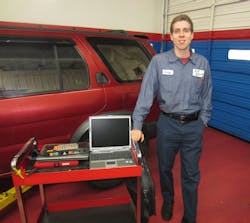Making the rounds on the Internet, I came across a DIYer online forum discussion of diesel fuel additives. The posters said that "common knowledge" dictates that ULSD fuel, with only 15 PPM of sulfur, lacks the sulfur necessary to properly lubricate a diesel engine and its components (fuel injectors, fuel pump, etcetera).
While what they say may be true of older diesels, newer diesels are designed to work with the new fuel, so it is hard to endorse any fuel lubricant as "necessary," though it might be helpful.
However, with all the anecdotal evidence of fuel pumps and injectors going bad from ULSD fuel, the DIYers supposedly "know" that they need to add diesel fuel treatments to their vehicles. So, they took it upon themselves to find out which one is best.
A participant on the forum solicited funds from other diesel enthusiasts to find just that out. Other people on the forum commended the effort. The result is a study that recommends certain brand lubricants over others.
I do not think the person(s) involved in this study was intentionally ripping people off. Instead, I think he was acting like any typical DIYer who wastes his time and money on trying to devise methods to fix his own car instead of paying a professional that actually knows something about diesels.
The study appears scientific if you do not know anything about science. The forum member who claims to have overseen this study says he has a non-automotive day job, but he styles himself an owner of a laboratory that he named after himself. Apparently, he's "Dexter" by night.
His self-titled laboratory apparently paid another laboratory, whose existence I could not verify, to put the additives to the test.
Based on my interpretation of their tests, the laboratory used ball bearings and rubbed them against each other. Then they evaluated the degree of scoring that occurred when each fuel and additive was used to lubricate them. The fuel and additive used when the ball bearings showed the least scoring came out the best on the test while the fuel/additive used with the ball bearings with the most scoring came out the worst.
The supposed laboratory then tested these different fluids with untreated ULSD fuel as the control group. The whole premise of the study was that ULSD was insufficient in some way, but they could not prove this, because regular ULSD was not even tested.
Wouldn't the whole point be to see if ULSD really needs any lubricant at all? Why not test the normal ULSD fuel versus the untreated ULSD in order to find out if they even have to use the treatment? Apparently, they do not have a firm understanding of science.
Furthermore, two of the fluids were not even bought off the shelf, so they could have been adulterated or modified in order to perform better in the test.
I am not a big fan of the ivory-tower scientific elite whose insider-based peer review process is not as neutral as it may seem, but I think this DIY study can be chalked up to the following: You are entitled to your own opinions, but not your own facts.
Attempts were made to contact the supposed research laboratory for this blog, but they could not be reached.

